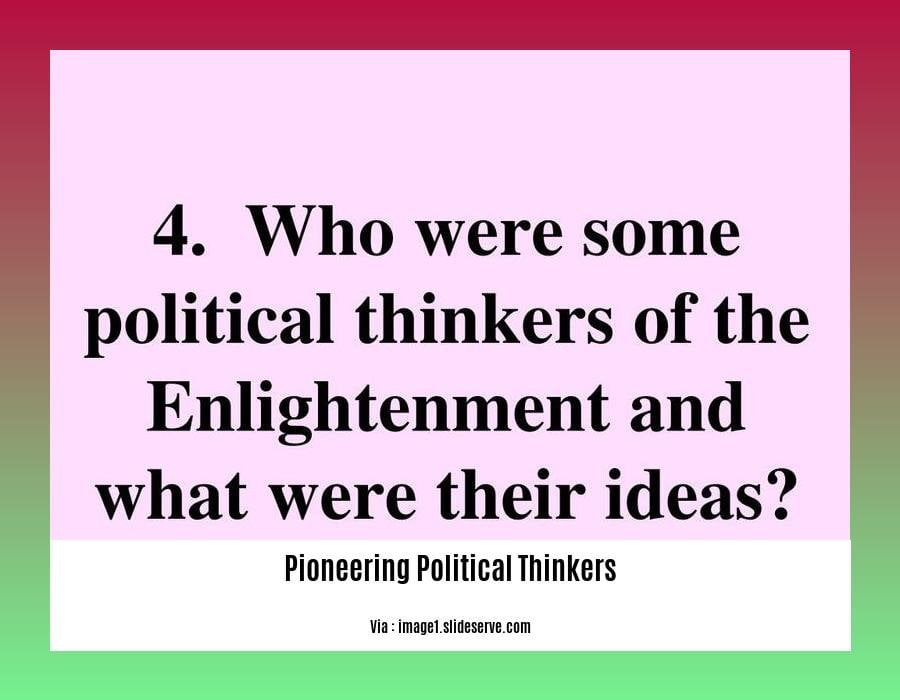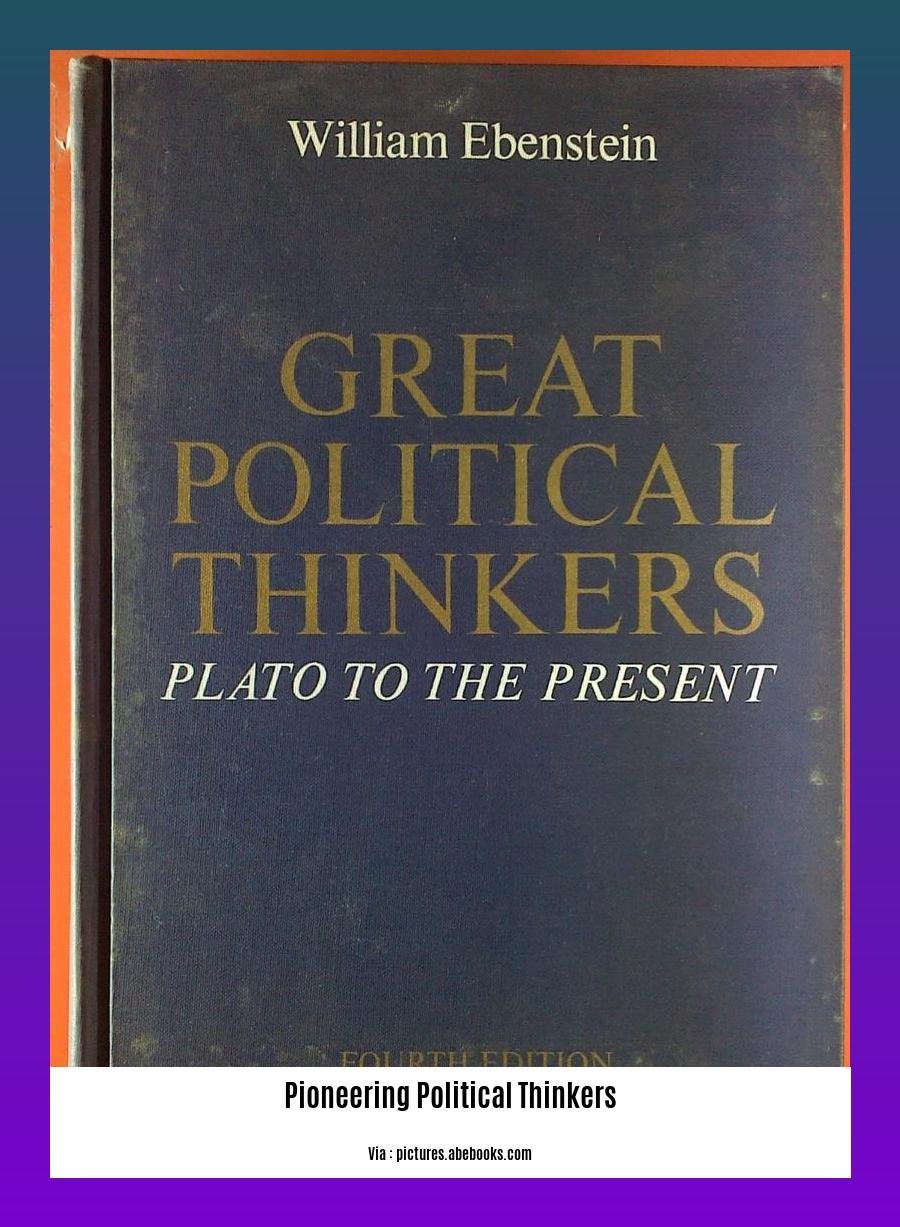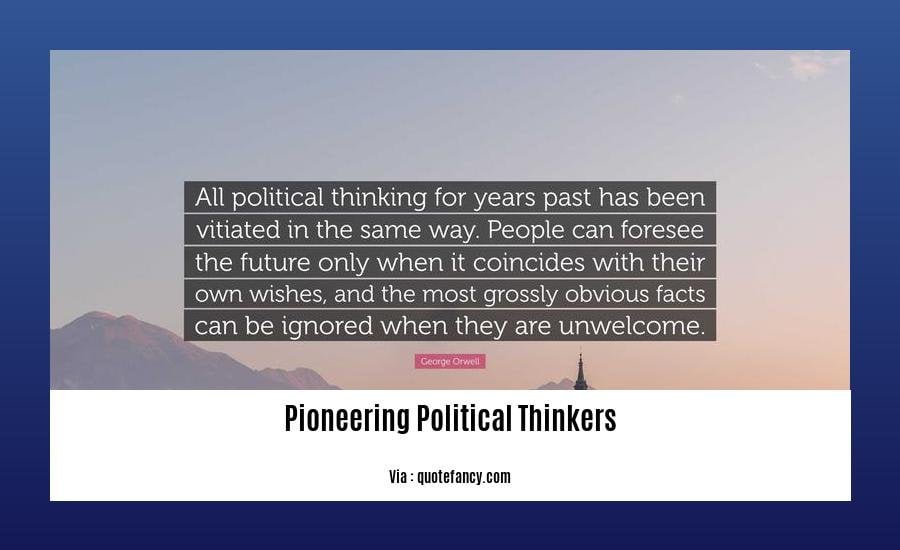The Pioneering Political Thinkers Who Transformed Our World: delve into the profound impact that these trailblazers have had on our political landscape, inspiring generations to come and shaping the very fabric of our societies.
Key Takeaways:

- Western political thought has its roots in ancient Greece.
- Greek philosophers like Plato and Aristotle shaped our political understanding.
- The Enlightenment era fostered ideas like liberty and constitutionalism.
- Influential thinkers include Locke, Hobbes, Machiavelli, Rousseau, and Mill.
- These thinkers developed theories on government, citizen rights, and the individual’s role in society.
Pioneering Political Thinkers
They changed the face of politics forever.
Throughout history, pioneering political thinkers have emerged, challenging our understanding of power, governance, and the relationship between the individual and society. From Plato’s ideal republic to Machiavelli’s pragmatic approach, these thinkers have shaped the very fabric of our political landscape.
Plato: The father of Western political thought, Plato’s Republic envisioned an ideal government ruled by philosopher-kings. His ideas on justice, virtue, and the role of the state continue to influence us today.
Aristotle: Aristotle, Plato’s student, expanded on his mentor’s ideas, emphasizing the importance of citizen participation and the common good. His concept of the “polis” (city-state) has had a profound impact on urban planning and democratic principles.
Niccolò Machiavelli: The Prince by Niccolò Machiavelli is considered a masterpiece of political realism. Machiavelli argued that politics is a ruthless game, where rulers must use deception and cunning to maintain power. His ideas still resonate in the cutthroat world of realpolitik.
John Locke: Locke’s theory of social contract proposed that individuals have natural rights, including life, liberty, and property. This idea formed the foundation for modern democracy and constitutionalism.
Jean-Jacques Rousseau: Rousseau’s concept of popular sovereignty argued that all citizens have a right to participate in government. His ideas inspired the French Revolution and continue to shape democratic movements worldwide.
Their Legacy Lives On
The ideas of these pioneering political thinkers have had a profound impact on the development of politics, law, and society. Their contributions continue to shape our understanding of the role of government, the rights of citizens, and the nature of the human condition.
Looking for political leaders ahead of their times? They had these great visions before their era. You might be amazed by these visionary leaders before their era. As these forward-thinking political leaders predicted the future with their great eyes and ideas.
Machiavelli: The Pragmatic Architect of Political Power
Machiavelli, a renowned Renaissance thinker, revolutionized political theory with his pragmatic approach. His seminal work, “The Prince,” challenged traditional morality in politics, arguing that the ends justify the means.
Key Takeaways:
- Pragmatic Politics: Machiavelli believed in securing power above all else, advocating for ruthless and strategic maneuvers.
- Separation of Morality: He argued that rulers should not be bound by moral constraints in their pursuit of political goals.
- Power as the Ultimate Goal: Machiavelli viewed the acquisition and maintenance of power as the primary objective of politics.
- Influence on Modern Politics: His ideas have influenced political strategies and tactics throughout history, shaping the balance of power in societies.
- Enduring Legacy: Machiavelli’s pragmatic approach to politics remains relevant today, inspiring debates on political ethics and the limits of power.
Most Relevant URL Source:
Locke: Enlightenment’s Champion of Liberty
Locke, a luminary of 17th-century political thought, left an indelible mark on our understanding of government and individual rights. His profound ideas laid the groundwork for modern democracy.
Key Takeaways:
- Natural Rights: Locke asserted that humans possess inherent rights to life, liberty, and property. These rights are inalienable and cannot be taken away by any government.
- Social Contract: Society is formed through a voluntary agreement among individuals to establish a government that protects their rights.
- Limited Government: Government’s authority is restricted to protecting individuals’ rights. It should not interfere in their personal lives or economic pursuits.
- Separation of Powers: Power should be divided among different branches of government to prevent tyranny.
- Religious Toleration: Locke advocated for the separation of church and state, ensuring freedom of religious belief and expression.
Locke’s Legacy:
Locke’s ideas reverberate today, shaping constitutions and legal systems worldwide. His defense of individual rights, limited government, and the rule of law has inspired generations of thinkers and activists. His enduring legacy serves as a beacon for those seeking to build more just and equitable societies.
Most Relevant URL Source:
Rousseau: The Pioneer of Popular Sovereignty
When we talk about reshaping political discourse and challenging conventional wisdom, we cannot overlook the monumental contributions of Jean-Jacques Rousseau. During the twilight of the Enlightenment, he emerged as a beacon of innovation, forever altering how we perceive politics and ethics.
The Essence of Rousseau’s Philosophy
Rousseau’s revolutionary ideas centered around the concept of popular sovereignty, a concept that upended traditional notions of political legitimacy. He vehemently argued that true political power resides not in the hands of a monarch or an elite few but within the collective will of the people.
The Social Contract
At the heart of Rousseau’s philosophy lay the idea of a social contract. He posited that individuals, in a state of nature, freely entered into an agreement to create a civil society. This agreement, he believed, established the foundation for legitimate authority and the protection of individual rights.
The General Will
Rousseau’s notion of the “general will” is central to his political thought. He believed that within every community, there exists a collective will that transcends individual interests and represents the true will of the people. This general will, he argued, should guide all political decisions and actions.
Rousseau’s Legacy
Rousseau’s ideas have had a profound impact on modern political thought and practice. His emphasis on popular sovereignty inspired democratic revolutions and shaped the constitutions of countless nations. His belief in the importance of individual autonomy and the common good continue to resonate in contemporary political debates.
Key Takeaways:
- Rousseau challenged the divine right of kings and argued for popular sovereignty.
- He believed that true political power resides in the collective will of the people.
- His idea of a social contract established the foundation for legitimate authority.
- Rousseau’s notion of the “general will” emphasized the importance of collective decision-making.
- His ideas have significantly influenced modern democratic thought and practice.
Most Relevant URL Source:

FAQ
Q1: Who are some of the most important pioneering political thinkers in history?
Q2: What were some of the key ideas developed by pioneering political thinkers during the Enlightenment?
Q3: How did Niccolò Machiavelli’s ideas about power and morality influence political thought?
Q4: What were John Locke’s contributions to liberal political thought?
Q5: How did Jean-Jacques Rousseau’s ideas mark the end of the Enlightenment and revolutionize our understanding of politics and ethics?
- China II Review: Delicious Food & Speedy Service - April 17, 2025
- Understand Virginia’s Flag: History & Debate - April 17, 2025
- Explore Long Island’s Map: Unique Regions & Insights - April 17, 2025
















